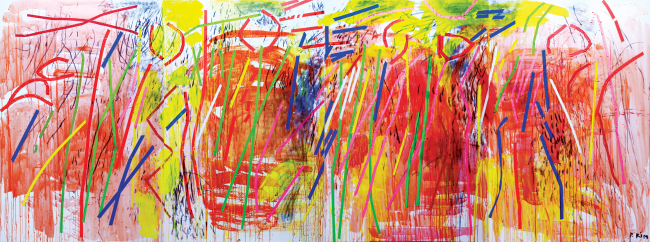Artist Po Kim was a victim of political upheavals in Korea. He was accused of being a communist and tortured by the South Korean authorities in 1950, right after he returned from a drawing trip with his students to an island in the West Sea.
When the Korean War broke out shortly after, he was cleared of charges, but then arrested again, this time by the North Korean People’s Army for being a pro-American activist.
“As soon as I was cleared of charges and freed from prison I walked to Gwangju. But the city was already under the control of the North Korean army. I didn’t know what happened. I am not a political person. I am not interested in communism or socialism. I am a liberal person,” Kim once said.
Soon after, the artist moved to the U.S. in 1955 and began a new life as an exchange professor at the University of Illinois. Since then he isolated himself from Korea for more than 40 years until he died earlier this year.
“I wasn’t going to visit Korea. Never again. I lost all my love for the country. I was so scared of the police just passing by me, because they almost killed me several times,” said Kim at his first solo exhibition in Seoul in 1995.
Shinsegae Gallery in Seoul commemorates the artist, who built a substantial career in art in the U.S. and claimed a unique position among the dominant abstract expressionists of the 1960s. The exhibition is co-organized by Chosun University Museum of Art, to which Kim donated some 300 works of work before he died. Kim was the first dean of the art school of Chosun University, then the first art school established in South Korea. The school has a museum dedicated to him and his wife and artist Sylvia Wald.
The exhibition shows his painting styles evolving throughout his life in the U.S. They developed from dark colored paintings to colorful, cheerful images. In the 1950s and the 1960s, Kim produced abstract expressionist paintings that combined features of traditional Asian calligraphy.
“When I first set foot in the U.S., it was the golden age for abstract expressionism. It served me as the right means to express my suppressed emotions under the authoritative South Korean government,” Kim once said.
In the 1970s, he took a dramatic turn in his style as though he grew tired of abstract painting. He returned to figurative images and began to draw still-life color pencil drawings. His fish and sweet pepper drawings show his detailed observations of ordinary objects.
 |
“New Life” by Po Kim. (Chosun University Museum of Art) |
In the late 1980s, he began to paint larger canvases covering almost the entire wall. His works portrayed the utopian world that only existed inside him, such as a natural paradise where animals play with humans. His final painting, “New Life,” completed in 2012, is on display at the gallery.
“I began to realize how old I am and how close death is. So I think I have to work hard and paint more while I am alive,” he said, finishing his final work in 2014.
The exhibition runs through Jan. 20, 2015, and plans to move to Shinsegae branch galleries in Gwangju, Shinsegae Centum City in Busan and Incheon until April. For more information, call (02) 310-1921.
By Lee Woo-young (
wylee@heraldcorp.com)








